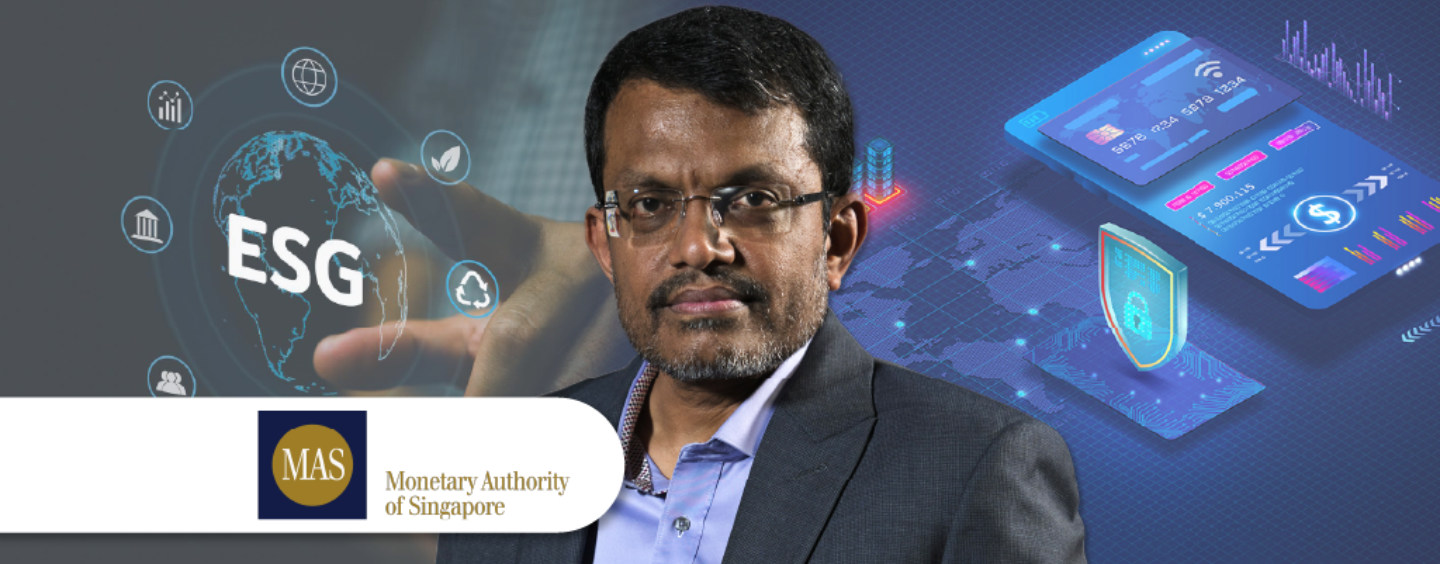
MAS’ Ravi Calls on Fintechs to Solve Two Foundational Issues
by Fintech News Singapore October 11, 2022The two challenges in financial services where fintech can potentially play a positive transformative role are cross-border payment and settlement as well as high quality and trusted ESG data, said Ravi Menon, Managing Director at the Monetary Authority of Singapore (MAS) during a keynote speech at Sibos 2022 yesterday.
He called these foundational issues that need to be addressed before broader progress can be made.
First Challenge – Cross-Border Payment and Settlement

Ravi had put forth three possible ways to solve the cross-border payments challenge:
1. Link up faster payment systems
Singapore begun linking its payment system PayNow starting with Thailand’s PromptPay, with a bilateral linkage launched last year, and are now completing linkages with India’s Unified Payment Interface and Malaysia’s DuitNow.
However, MAS found that such bilateral linkages are time consuming and expensive to implement. For example, three countries would require three bilateral links but 20 countries would require 190 bilateral links.
To remedy this, a multilateral solution to efficiently link up countries’ faster payment systems is needed.
At present, the BIS Innovation Hub’s Singapore Centre is developing a central platform for multilateral linkages to be built on countries’ existing faster payments infrastructure dubbed as Project Nexus.
Through Project Nexus, transactions can be cleared in 60 seconds on a 24/7 basis with lowers costs at less than 3% of transfer value. Users will have wider access as the model includes banks as well as non-bank financial institutions. with greater transparency and security.
Ravi shared that ASEAN countries have a shared vision of a multilateral network of payment linkages by 2025 and Project Nexus can be a key enabler for this.
However, Ravi concedes that linking faster payment systems solves the cross-border payments problem but not settlements as the settlement process for such payments only happens sequentially.
This is where the second solution comes in: a multi-CBDC common platform.
2. Building a multi-CBDC common platform
Wholesale CBDCs, which are direct liabilities of central banks, are well suited to be used on distributed ledger technology to support simultaneous settlement, or the exchange of two linked assets in real-time.
The BIS Innovation Hub is carrying out different multi-CBDC platform experiments across its Swiss, Hong Kong, and Singapore centres.
- Project Jura in the Swiss Centre is exploring the direct transfer of Euro and Swiss Franc wholesale CBDCs between French and Swiss commercial banks on a single distributed ledger platform operated by a third party.
- Project mBridge in the Hong Kong Centre is exploring multi-currency cross-border payment capabilities built on distributed ledger technology, through which multiple central banks can issue their own CBDCs and distribute them to participants.
- Project Dunbar in the Singapore Centre is a collaboration among MAS, the Reserve Bank of Australia, Bank Negara Malaysia, and the South African Reserve Bank.
3. Expand private sector blockchain-based payment networks
Securely-backed stablecoins or tokenised bank deposits issued by private sector players can also be used to enable cheaper and faster cross-border payment and settlement.
Unlike private cryptocurrencies, whose prices fluctuate wildly, these digital currencies are suitable as payment instruments on distributed ledgers as they combine the advantages of tokenisation with the reliability of fiat currencies.
These private sector led cross-border payment and settlement initiatives are beginning to scale:
- Securely-backed stablecoins such as the USD Coin and Pax Dollar issued by fintech players Circle and Paxos respectively, have been expanding their networks and partnerships with traditional finance firms. They have achieved near real-time 24/7 settlement and lower cost.
- Visa has integrated popular stablecoins into its payment services, allowing users to make international payments in USD Coin.
- Partior – a commercial joint venture among JP Morgan, DBS and Temasek – has been able to achieve reductions in settlement time from days to mere minutes for Singapore Dollar and US Dollar exchanges, using a blockchain based multi-currency cross border clearing and settlement platform.
Second Challenge: High Quality and Trusted ESG Data

Ravi asserted that good ESG data is foundational for the climate agenda as it facilitates effective management of climate-related risks, enables robust sustainability reporting and helps to catalyse green and transition finance flows.
However, there is a significant gap between ESG data needs and the ESG data available.
There is a need for good data on firms’ carbon footprint, historical carbon emission trends, and compliance with their respective transition targets. Additionally, data on the climate-related risks their physical assets are vulnerable to is also essential.
But the ESG data acquisition process is often manual, tedious and costly. ESG data verification is at a nascent stage and this impacts the credibility of reporting.
To spur the growth of the green fintech ecosystem, MAS has launched an ESG Impact Hub which provides a physical locality to facilitate discovery, scaling and deployment of technology solutions that support the financial sector’s ESG needs, notably on the data front.
Additionally, to harness green fintech to build a credible ESG data landscape, MAS has launched a collaborative effort with the financial industry called Project Greenprint.
Project Greenprint seeks to build digital utilities that streamline the collection, access, and use of climate and sustainability data.
The initial phase of Project Greenprint focuses on four digital utilities:
- ESG Disclosure Portal titled ESGenome
- ESG Registry titled ESGpedia
- Data Orchestrator which will be launched next year
- Digital Marketplace also to be launched next year
Ravi said that Project Greenprint and the ESG Impact Hub are not MAS projects, or even Singapore projects.
They are open-ended, collaborative platforms, for financial institutions and fintech players from around the world to connect to, collaborate, and co-create innovative solutions to advance the sustainability agenda.
MAS’ goal is to foster a vibrant ESG fintech ecosystem spanning across countries.







